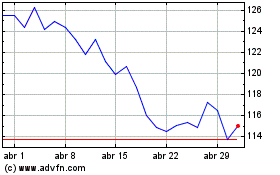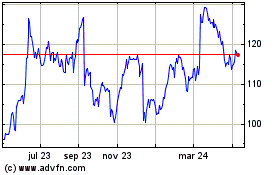Oracle Will Stay With Sole CEO -- WSJ
13 Diciembre 2019 - 2:02AM
Noticias Dow Jones
Software company reports higher profit but disappointing revenue
for quarter
By Maria Armental
This article is being republished as part of our daily
reproduction of WSJ.com articles that also appeared in the U.S.
print edition of The Wall Street Journal (December 13, 2019).
Oracle Corp. said it won't replace its late co-CEO, Mark Hurd,
leaving Safra Catz as the sole top executive leading the software
giant after years of operating with an unusual, two-chief
structure.
In the company's first earnings report since Mr. Hurd's death in
October, Oracle founder and Chairman Larry Ellison said it is
working to strengthen its management team, to build develop a group
of executives who are "potential CEOs when both Safra and I retire,
which is not anytime soon." But he described the two-CEO setup as
unusual and not something Oracle is looking to repeat.
Ms. Catz now leads Oracle as sole CEO. Company co-founder Larry
Ellison, who ceded the CEO post to Mr. Hurd and Ms. Catz in 2014,
remains active as chairman and chief technology officer.
The twin-CEO structure has had a mixed record at the small
number of companies that have tried it. But two of Oracle's rivals,
Salesforce.com Inc. and SAP SE have also adopted it over the past
two years.
The Silicon Valley company, best known for its corporate
database software, reported $9.61 billion in revenue for the
quarter ended Nov. 30, missing analysts' projected $9.65 billion,
according to FactSet.
Profit for the second quarter rose to $2.31 billion, or 69 cents
a share. Excluding stock-based compensation and other items, profit
rose to 90 cents a year, from 80 cents a share a year earlier.
Analysts surveyed by FactSet expected a profit of 68 cents a
share, or 89 cents a share as adjusted.
For the current quarter, Oracle gave a somewhat muted outlook.
It projected adjusted profit of 95 cents to 97 cents a share
compared with analysts' projected 97 cents. Sales, Oracle said,
would rise roughly 2%, broadly in line with analysts'
projections.
The company said it is seeing strong demand and higher
conversion rates and expects strong momentum in the second half of
this fiscal year to carry through 2021.
Oracle deftly navigated constant technological changes since it
was founded in 1977; but in the era of cloud computing, it has been
playing catch-up to the likes of Amazon.com Inc., Microsoft Corp.
and Alphabet Inc.'s Google.
In the most recent quarter, Oracle reported a combined $7.94
billion cloud and license revenue, just shy of analysts'
projections of roughly $8 billion.
Oracle has been trying to introduce new features to its cloud,
including greater automation, to help lure customers away from
other vendors, in particular market leader Amazon.
This month, the company added to its board Vishal Sikka, founder
and chief executive of artificial-intelligence company Vianai
Systems and a SAP and Infosys Ltd. veteran, highlighting Mr.
Sikka's experience in AI and machine learning.
Shares, which have been trading near record levels in recent
months, closed Thursday at $56.47 and fell 2.6% in after-hours
trading.
Write to Maria Armental at maria.armental@wsj.com
(END) Dow Jones Newswires
December 13, 2019 02:47 ET (07:47 GMT)
Copyright (c) 2019 Dow Jones & Company, Inc.
Oracle (NYSE:ORCL)
Gráfica de Acción Histórica
De Mar 2024 a Abr 2024

Oracle (NYSE:ORCL)
Gráfica de Acción Histórica
De Abr 2023 a Abr 2024
